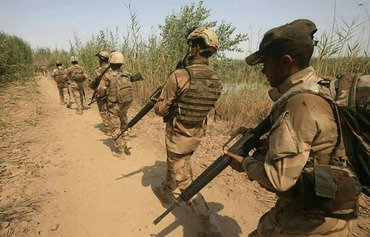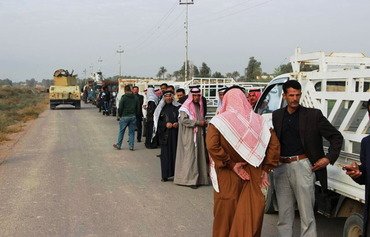After suffering three years of displacement, Baghdad Belt residents are returning to their homes in droves, Iraqi officials told Diyaruna.
The Baghdad Operations Command has cleared the area circling the Iraqi capital of "Islamic State of Iraq and Syria" (ISIS) elements and destroyed their hideouts, which posed a threat to the security of the capital.
At the directive of Prime Minister Haider al-Abbadi, "1,200 families have returned to their original areas of residence in al-Ersan, and 110 families to al-Harkawi", south and south-west of Baghdad, the command said in a statement.
On October 18th, the command announced that 3,000 families have returned to their homes west of Baghdad, notably in Albu Alwan.
Additionally, 620 displaced families have returned to al-Saadan, al-Ersan and al-Khudair south of Baghdad, the command said two days earlier.
Reduced terror activity
Iraqi forces are paying great attention to Baghdad Belt areas and have made "extraordinary efforts in the hunt for ISIS cells and supporters", said Baghdad provincial council member Ghalib al-Zamili.
The military operations there have helped consolidate security and reduce the militants’ activity to a great extent, he said, which has been reflected in the improved security situation in the capital.
"After tightening security and clearing the area of improvised explosive devices (IEDs) and mines, the conditions are now ripe for the return of residents to their homes and the rehabilitation of services," he told Diyaruna.
Residents have returned to most areas adjacent to the capital, said al-Zamili, adding that they have undergone security checks to ensure no ISIS militants have infiltrated their ranks.
He stressed the residents' critical role in maintaining security.
"The co-operation of the tribesmen and their participation in eliminating terror threats is crucial," he said.
"The return of displaced residents to the Baghdad Belt after a long wait is undoubtedly a positive move," said security expert Jassim Hanoun.
"We must work to win [the trust of] local residents and strengthen their security role as they know their areas and can identify strangers and monitor suspects," he told Diyaruna.
Updating security plans
"There is an urgent need to update security plans by relying on intelligence sources in tracking terrorist cells, deploying ambushes, and conducting surprise searches," Hanoun said.
Past security plans relied heavily on fixed checkpoints, he said, "which no longer pose a challenge to armed groups, as they know the areas where those points are deployed and can access residential areas in many [other] ways".
Hanoun called for establishing a special operations room to manage the security of Baghdad Belt areas, with the participation of all security, military and intelligence services.
Consolidating stability also requires improving services and promoting development," he said, noting that most of the belt areas are agricultural areas, which, if left untended, would become a fertile ground for terrorists.
Residents keen to maintain security
"Returning residents are ready to defend their areas," said Iraqi MP Iskandar Witwit, who serves on the parliamentary security and defence committee.
"These people have suffered badly from terrorism and displacement and do not wish to experience that again," he told Diyaruna.
Today they are more keen to stabilise their areas and support the security forces, he said.
Baghdad’s security is contingent on the security of its outskirts, Witwit said, adding that military operations continue in the capital’s belt, particularly in the orchards.
Ibrahim Taha, a 53-year-old resident who has returned to al-Ersan, expressed his gratitude to the security forces for clearing his area of ISIS elements.
"We pledge to our forces that we will be their best supporters and help them enforce the law and push away terrorism," he told Diyaruna.

![Displaced residents from the area of al-Ersan attend a ceremony held on October 25th to mark their return to their homes in the Baghdad Belt area. [Photo from the Baghdad Operations Command Facebook page]](/cnmi_di/images/2017/11/03/10158-Iraq-Baghdad-belt-600_384.jpg)





